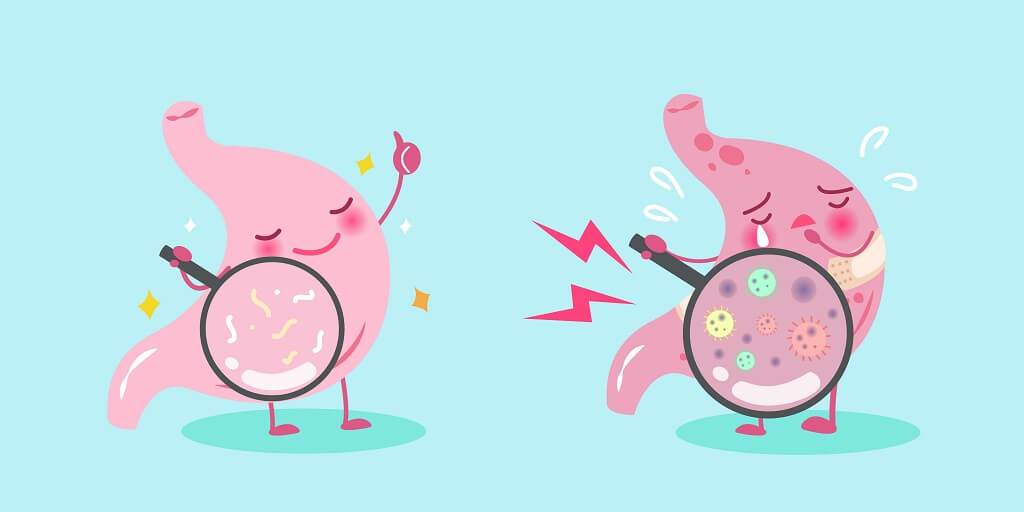6 Signs You Have A Problem In Your Gut

Although the ongoing pandemic is teaching people to be more conscious and careful of their health, there's still little information about the importance of gut health. But understanding how the gastrointestinal system, or the gut, works is crucial in keeping the entire body healthy.
The Importance Of Gut Health
People eat every day but seldom think about how the body processes the food they eat and what influences their gut's health. The gut is the layman term for the gastrointestinal system, and may also be referred to as the digestive tract or digestive system.
The gut is not limited to the stomach and intestines, but it also includes the entire tract from the mouth to the rectum. The esophagus, colon, gall bladder, liver, pancreas, the small intestine is all part of the digestive tract, although the liver, gall bladder, and pancreas are considered accessory organs.
Your gut is crucial provides your body with nutrients from the food that you eat. The process of digestions works in this sequence:
- Mouth and Esophagus: Ingestion starts in the mouth, and food passes through the esophagus by swallowing.
- Salivary Glands: Amylase is produced by the exocrine glands that help convert starches into maltose.
- Stomach: The esophagus leads to your stomach–the organ that holds food and turns it to paste or liquid consistency with the help of enzymes and acids.
- Small Intestine: By using the enzymes from other organs to break it further down, food is moved through your small intestine. The nutrients in the food you consume are absorbed through the ileum and jejunum of the small intestine.
- Gall Bladder, Liver, and Pancreas: These organs are responsible for producing enzymes that aid the process of digestion.
- Large Intestines: Another tube-like organ similar to the small intestine, the large intestine moves the waste materials toward the rectum.
The human digestive system can harbor different types of bacteria, mostly in the small and large intestines. The stomach, however, is too acidic to allow any bacterial growth. Friendly bacteria in the gut is essential for maintaining your overall health. If bad bacteria overcome your gut microbiota, you'll become susceptible to serious health conditions.
The ingredients in Bio Complete 3 are handpicked to help support the health of your gut microbiome and immune system. Probiotics, prebiotics, and postbiotics come together to offer complete support. With Bio Complete 3 ingredients, you may notice that excess weight becomes easier to lose, youthful energy becomes easier to tap into.

Things You Did Not Know Was Harming Your Gut Health
Many people have no clue that they're doing some things that are harming their gut. Dr Ruscio, a medical doctor, author, and clinical researcher, believes that a healthy gut is a key to a healthy body. You may not know it, but there are some things that you regularly do that could be hurting your gut, such as:
- Smoking cigarettes and drinking too much alcohol
- Lack of physical activity and quality sleep
- Improper use of antibiotics
- A diet that lacks variety
- Eating too much processed or refined foods and artificial sweeteners
- Not consuming prebiotics
Gut bacteria imbalance can affect your body's key functions and cause several serious health conditions. Fortunately, improving your gut flora is not that complicated and can resolve or eliminate gut problems before they get out of hand.
7 Signs Of Gut Problems You May Not Know
Do you have a healthy gut? Many people had no idea that a bad gut may cause some health conditions or undesirable symptoms.
Here are 7 signs that you have gut problems:
1. Upset Stomach
Everyone can get an upset stomach now and then. But if you experience it often, you may need to reassess your gut health.
An upset stomach is characterized by various symptoms, including diarrhea, bloating, constipation, gas, and heartburn. Underlying gut problems may be causing these stomach disturbances.
2. Skin Allergies
An unhealthy gut may reflect on your skin, too. If you suffer from skin irritations or allergies, increase your intake of probiotic-rich foods and consume prebiotics to restore balance in your digestive system.
Skin conditions like eczema may be a result of an inflamed gut caused by allergens in your diet or poor choices of food.
3. Bad Breath
The condition of your gastrointestinal tract may be causing bad breath even if you brush your teeth frequently. Certain bacteria in your gut can cause halitosis and stomach ulcers, especially the H. pylori variety.
Taking probiotic-rich food can help prevent and treat bad breath caused by bad gut bacteria.
4. Insomnia And Fatigue
You may not know it, but the condition of your gut can affect your ability to sleep and influence your mood.
Serotonin is a hormone produced mostly in the gut, so a damage gastrointestinal tract can hinder the production of these hormones. Lack of sleep or poor sleep quality will result in restlessness and fatigue, and sometimes mood or behavioral disorders.
5. Joint Pain
People with joint pain may not realize that gut issues can exacerbate or promote inflammation in the joints. A person with an unhealthy gut may have increased chances of developing or intensifying joint pain.
Improving your gut microbiome may not treat arthritis, but it may help reduce inflammation in your joints.
6. Weight Gain
People often worry about gaining excess weight and look at the different factors that can cause it. Bad bacteria in the gut, however, is often overlooked.
Some types of bacteria may promote weight, while others can help you achieve a leaner physique, especially when mixed with the proper diet and exercise.
Takeaway
Your digestive system does a lot of work for your body, and it's only right to take care of it well. You can start restoring gut health by having yourself checked by a gut specialist. Simple changes in your diet also help such as eating more fiber-rich and fermented foods, reducing carbohydrate intake, and consuming foods with probiotics and prebiotics. Always brush your teeth after meals to prevent yeast growth in your gut. Strive to improve your sleep patterns because the reproduction of healthy bacteria is disrupted when you don't sleep based on the circadian rhythm of your body.
It's never too late to care or restore the health of your gastrointestinal system. With the help of a physician that specializes in the digestive tract problems, you can make the necessary changes to your diet, habits, and lifestyle, allowing you to restore gut health.
839GYLCCC1992




Leave a Reply